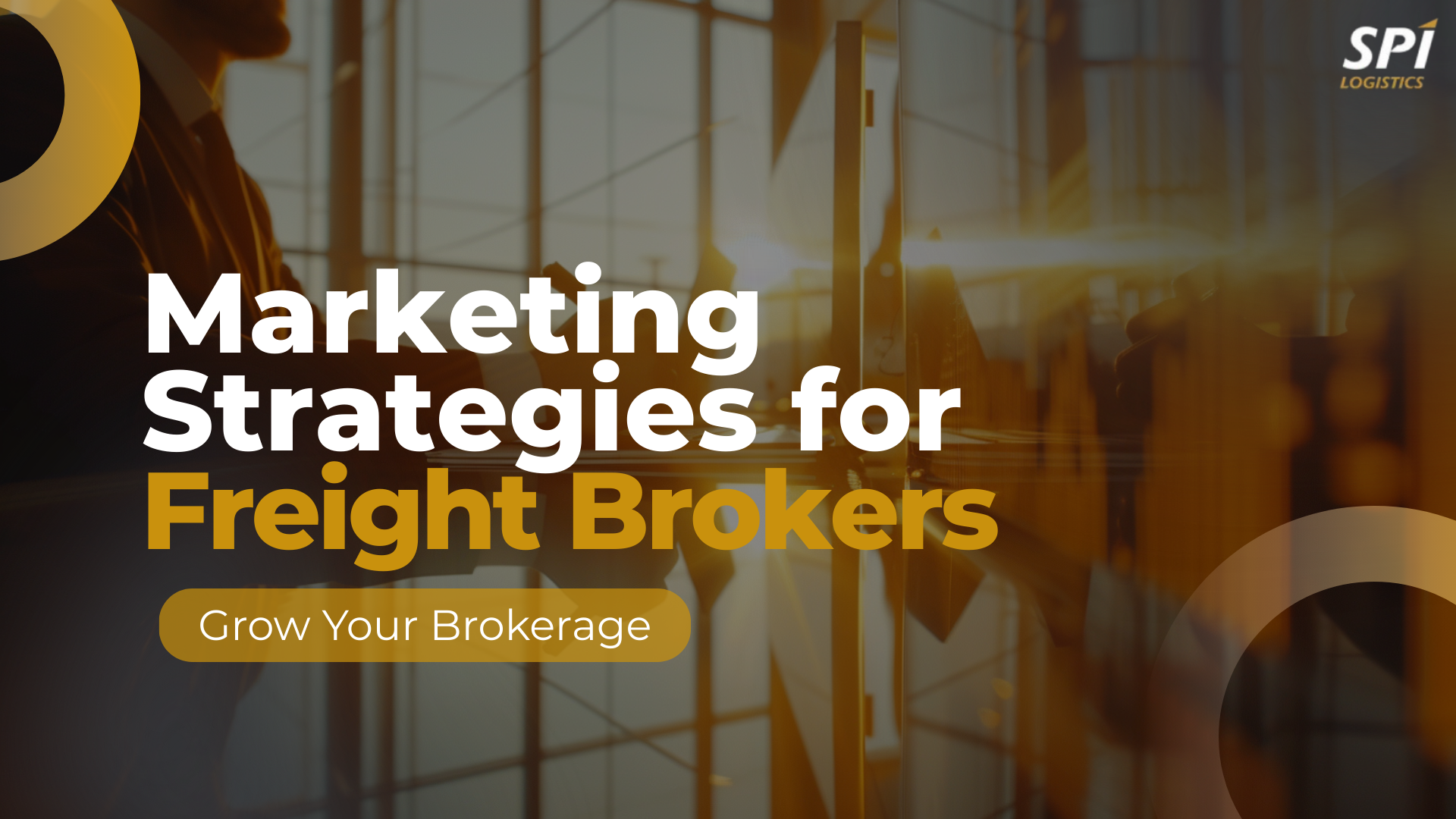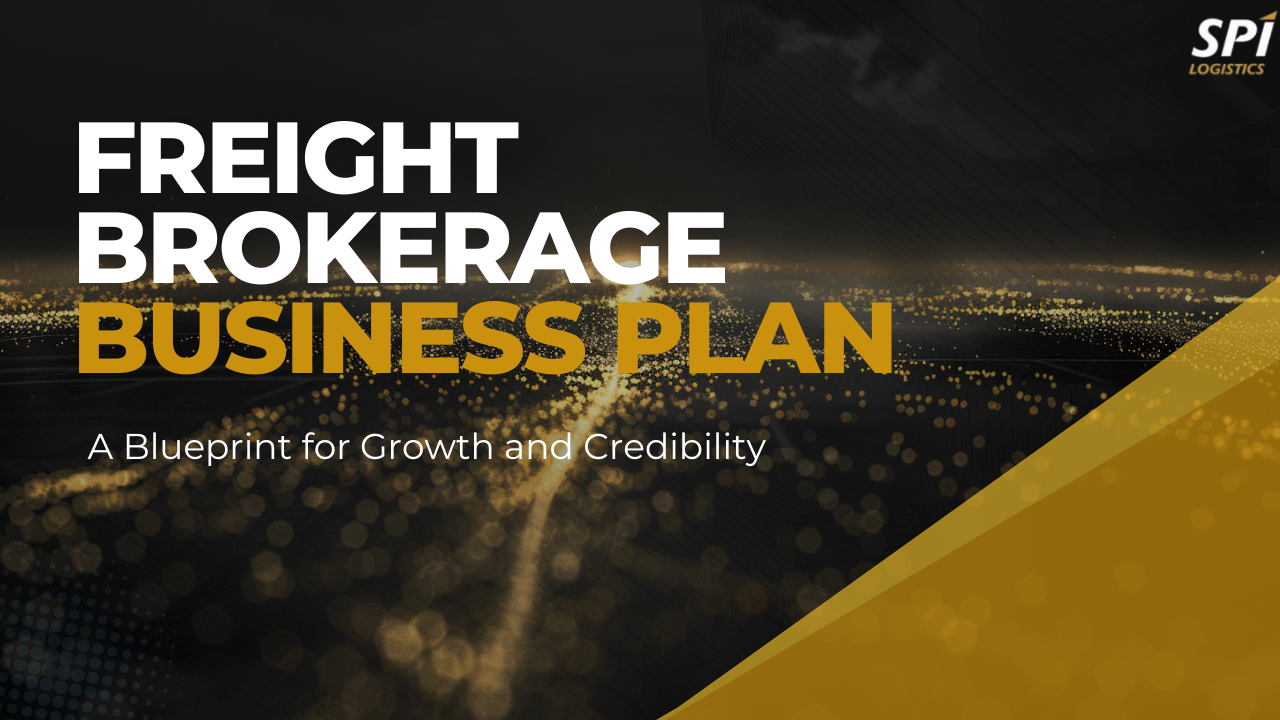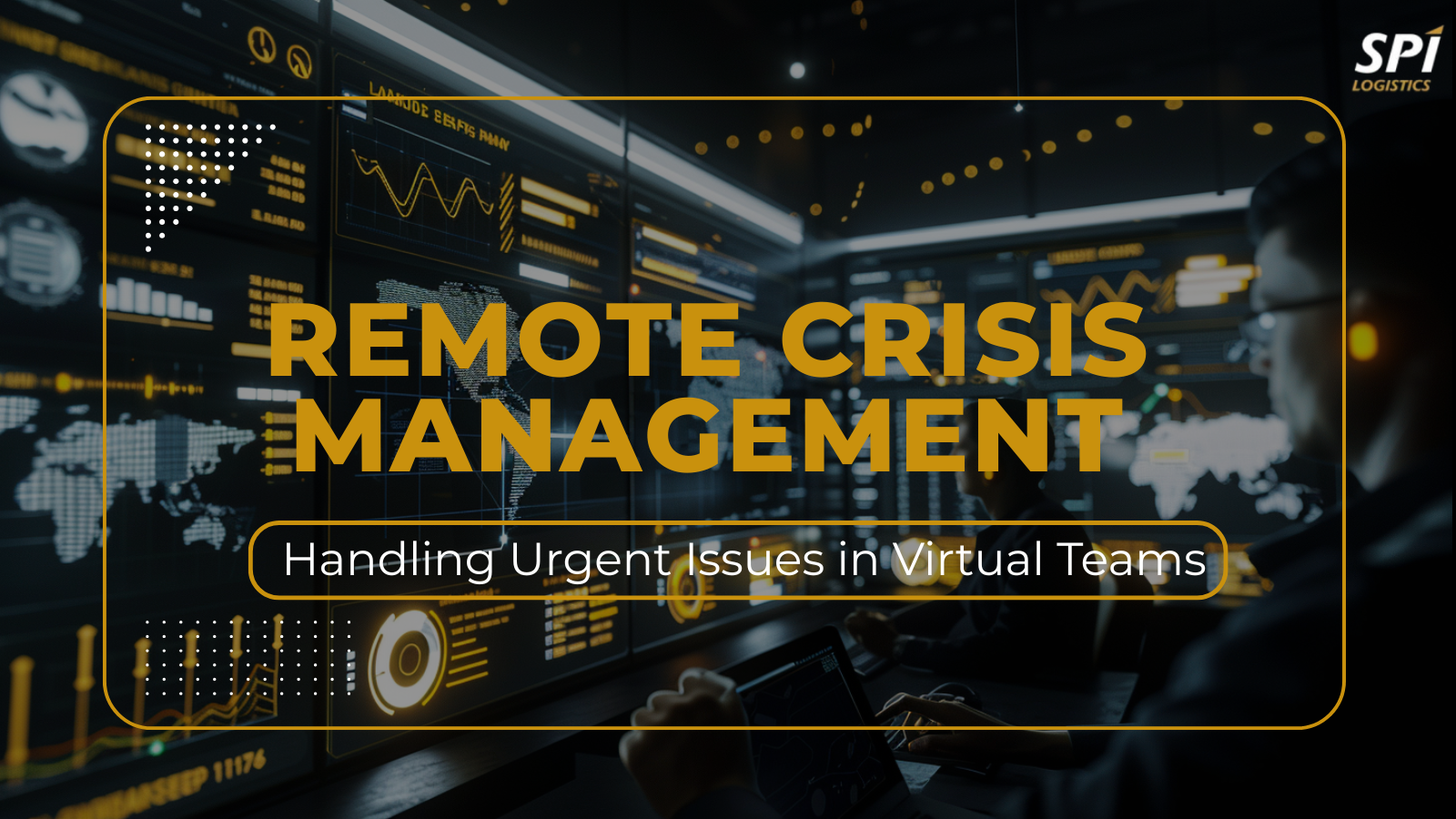In the logistics environment, small and independent freight brokers must stand out to win consistent freight, build long-lasting relationships, and grow a reputable brand. The right combination of freight brokerage marketing strategies, digital visibility, and targeted outreach can help brokers outperform even larger competitors.
This guide breaks down the best marketing tactics for independent freight brokers, focusing on approaches that are cost-effective, scalable, and designed for real-world brokerage operations.
Build a Strong Digital Presence for Maximum Visibility
A strong digital presence is no longer optional, it’s the backbone of modern freight brokerage marketing strategies. Whether you’re a new or established independent broker, your online presence determines how easily shippers can find you, evaluate you, trust you, and contact you.
Most shippers now research brokers the same way they shop (Transport Topics, 2024):
- By searching Google
- By checking local providers
- By comparing websites
- By reading reviews
- By scanning social media
This means every part of your online footprint, your website, SEO, listings, and digital branding, directly affects your credibility and your lead flow.
A. Build a High-Converting, Professional Website
Your website is your digital storefront. It’s where shippers go to decide:
- Should I trust this broker?
- Do they look credible?
- Do they actually understand logistics?
- Are they easy to contact?
If your website looks outdated, loads slowly, or feels unprofessional, a shipper will leave in seconds. A Freight Brokerage Website Must build trust, educate quickly, and convert visitors into leads (Journal of Commerce, n.d.).
What Your Website MUST Include
- Clear list of services (LTL, FTL, reefer, flatbed, cross-border, etc.)
- A compelling “About Us” section showing expertise, experience, and credibility
- Quote request buttons on every major page
- Real customer testimonials that highlight reliability
- Industry certifications (FMCSA authority, bonding, etc.)
- Fast load speed to reduce bounce rates
- Mobile-friendly design, since many shippers check sites on their phones
A polished website builds trust instantly, especially for small or newer brokers (Journal of Commerce, n.d.).
B. Leverage Digital Marketing for Freight Brokerage
Digital ads and online presence are crucial for brokers looking to grow.
Powerful Digital Marketing Tools
-
Google Business Profile
- Makes you visible on Google Maps
- Helps with local SEO for freight brokerage services
- Allows customers to leave reviews
-
Email Marketing Automations
- Automatically nurture prospects
- Send monthly rate trends or shipping tips
- Keep your name top of mind
-
Paid Search (Google Ads)
- Target phrases like “freight broker near me”
- Great for quick lead generation
-
Retargeting Ads
- Re-show ads to people who visited your website
- Increases conversion without heavy spend
Digital channels allow small brokers to compete directly with larger competitors at a fraction of the cost (Journal of Commerce, n.d.).
C. Optimize Content Using Freight Brokerage SEO Keywords
To generate inbound traffic consistently, your site must rank on Google.
SEO Must-Haves
- Include keywords naturally throughout blogs, service pages, FAQs
- Optimize meta descriptions and title tags
- Add internal links to improve navigation
- Publish high-quality blogs monthly
D. Strengthen Local SEO for Freight Brokerage Services
Local SEO is one of the highest ROI marketing channels for small brokerages.
Local SEO Essentials
-
Add your city + service keywords
- “Freight broker in Atlanta”
- “Dallas logistics support provider
- Create local landing pages
- Add your brokerage to logistics directories
- Collect Google reviews from shippers
- Make sure your NAP (Name, Address, Phone) is consistent everywhere
Local SEO for freight brokerage services helps you rank for shippers in your region, often beating bigger national brokers (FreightWaves, n.d.).
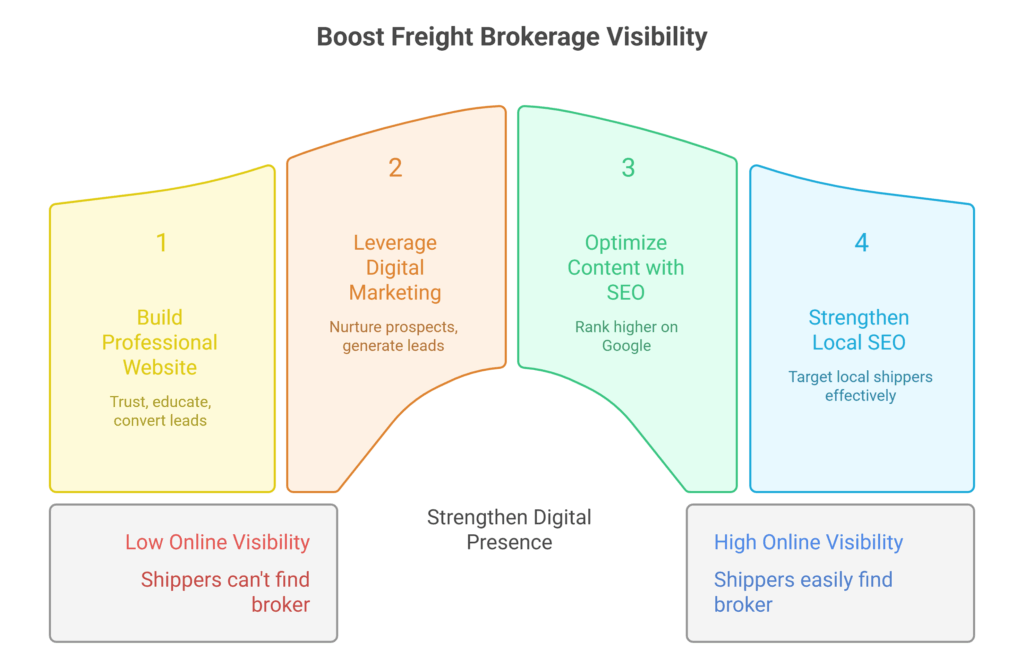
“Local SEO for freight brokerage services is one of the easiest long-term growth levers for smaller teams.”
What’s the biggest challenge your brokerage faces in improving online visibility?
Use Social Media to Build Authority & Attract Shippers
Social media marketing for freight brokers gives you a platform to educate shippers, build trust, and show consistency. Most decision-makers are active on LinkedIn,and they notice brokers who show up regularly.
A. What to Post to Build a Strong Presence
- Market trend updates (capacity shifts, fuel prices, lane rates)
- Behind-the-scenes brokerage operations
- Short shipping tips (“How to prevent detention”, etc.)
- Customer success stories
- Explainer videos on LTL, FTL, reefer, or compliance topics
- Industry commentary (FMCSA changes, port news, supply chain issues)
These types of posts position you as a knowledgeable resource, not just another salesperson (FreightWaves, n.d.).
B. Effective Platforms for Freight Brokers
- LinkedIn → Best for shippers & B2B relationships
- Facebook → Great for local carriers & dispatchers
- TikTok → Fast-growing for logistics education content
- YouTube → Ideal for long-form shipping guides
Being consistent drives brand awareness and inbound inquiries.
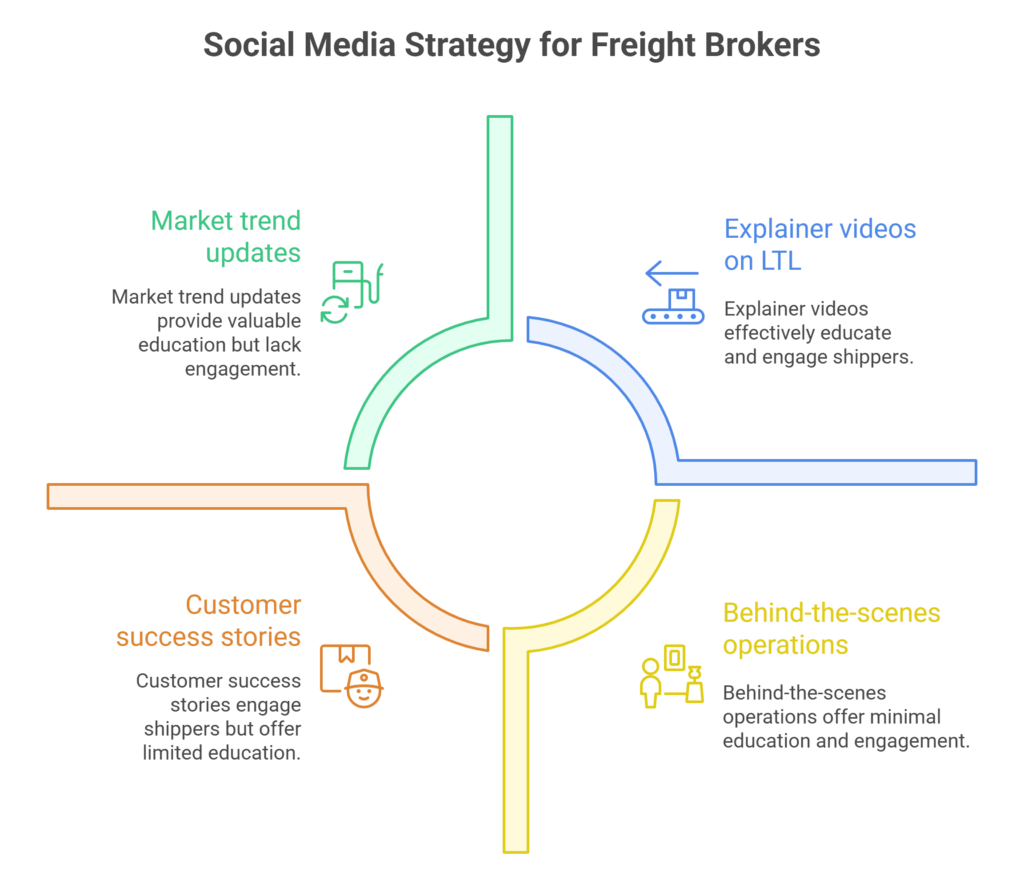
“Shippers hire brokers they trust, and social media is one of the fastest ways to demonstrate expertise consistently.”
Which social media platform has delivered the most engagement for your brokerage so far?
Use Cost-Effective Marketing Strategies That Fit Small Broker Budgets
Many new or small teams need cost-effective marketing for freight brokers. Here are tactics that deliver strong returns without high expense.
A. High-Impact, Low-Cost Strategies
- Email outreach campaigns
- Cold calling with targeted lists
- Posting daily on LinkedIn
- Guest appearances on supply chain podcasts
- Local networking events and chambers of commerce
- Industry Facebook groups
B. Small Freight Broker Marketing Ideas
- Partner with local trucking companies for cross-referrals.
- Offer a “first-load discount” for new shippers.
- Use AI tools to write content faster.
- Attend regional logistics meetups.
“Small brokerages win not by outspending big competitors but by out-teaching and out-serving them.”
Want to take your small freight brokerage to the next level? Learn how to scale your brokerage effectively here.
Build a Strong, Memorable Brokerage Brand
Branding isn’t about logos, it’s about perception. Strong freight brokerage brand building strategies help shippers remember you.
A. Elements of a Strong Freight Brokerage Brand
- Consistent colors, fonts, and messaging
- Clear mission and vision
- Professional headshots and team bios
- Clean, modern graphics for social media
- A tagline that reflects your promise (e.g., “Reliable Freight. Every Time.”)
Your brand should reflect reliability, communication, and industry expertise(Logistics Management, n.d.).
B. Build Credibility Over Time
- Collect verified reviews
- Display case studies
- Publish whitepapers
- Speak at trade events
- Collaborate with influencers or logistics podcasts
You want shippers to see you as a long-term logistics partner, not just a load-mover (FreightWaves, n.d.).
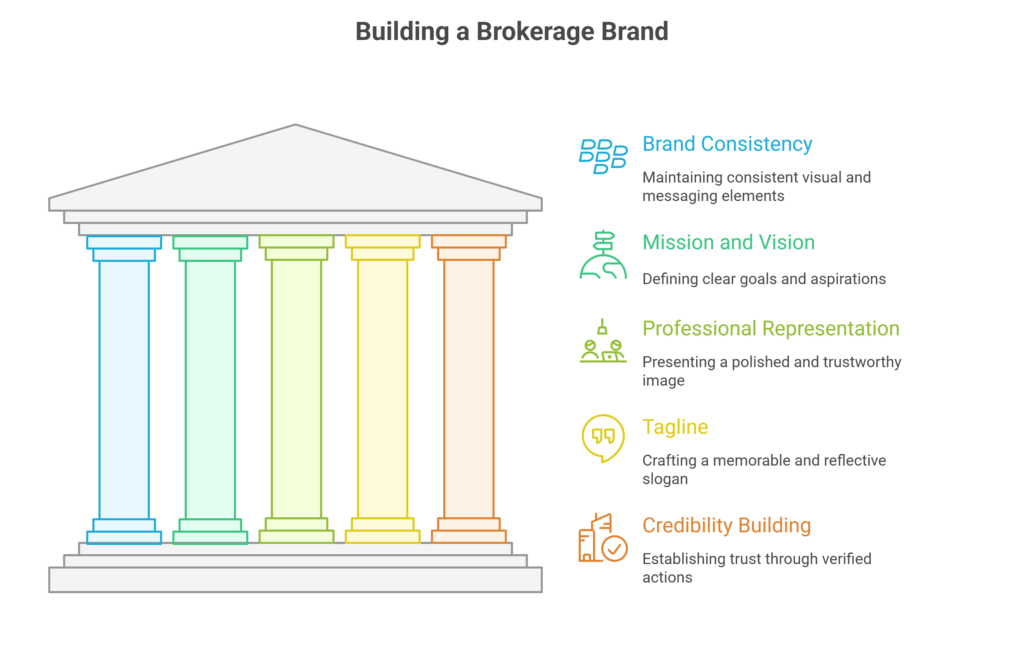
“Brokers who invest in branding see higher close rates because shippers perceive them as more serious and stable.”
How would you describe your brokerage brand in one sentence?
Develop a Strong Referral and Partnership System
Referrals remain the most reliable form of lead generation for small freight brokers. It also fulfills the requirement for freight brokerage referral marketing twice.
A. Referral System Components
- Offer incentives for referrals (discount, gift card, credit)
- Ask satisfied shippers directly
- Include referral requests in email signatures
- Create a referral landing page on your website
B. Partnership Opportunities
Build partnerships with:
- Local carriers (cross-referrals)
- Dispatch services
- Warehouses and 3PLs
- Manufacturing associations
- Trade groups
This builds an ecosystem of warm leads.
“Referral-based leads often close at double the rate of cold leads. Yet most small brokerages don’t formalize a referral program, making it a massive missed opportunity.”
Looking to streamline your brokerage’s operations and referral process? Discover how back-office support can help here
Frequently Asked Questions (FAQs)
1. What is the quickest way for a small freight broker to generate leads?
Referral marketing, LinkedIn activity, and Google Business optimization are the fastest ways to start generating real inquiries.
2. How often should an independent freight broker post content?
A minimum of 3–5 times per week on LinkedIn and 1–2 blogs per month keeps your brand present and search-friendly.
3. Do small freight brokers need paid ads?
Paid ads are helpful but not necessary. Most small brokers can grow rapidly using local SEO, social media, and referral marketing before spending money on ads.
Attract More Shippers and Build Lasting Relationships
Small and independent freight brokerages can compete,and win, using strategic, targeted marketing approaches that build trust, visibility, and meaningful long-term relationships. By focusing on digital marketing for freight brokerage, investing in local SEO, creating consistent content, developing partnerships, and using cost-effective marketing for freight brokers, your brokerage can attract more shippers and build a sustainable, scalable business.
Ready to expand your freight brokerage and secure more shipper partnerships? contact us to get expert guidance on growing your brokerage successfully.
References
FreightWaves. (n.d.). Freight market trends and transportation analysis. Retrieved from https://www.freightwaves.com
Journal of Commerce. (n.d.). Freight industry news and logistics data. Retrieved from https://www.joc.com
Logistics Management. (n.d.). Supply chain and transportation best practices. Retrieved from https://www.logisticsmgmt.com
Transport Topics. (2024). Trucking and freight industry updates. Retrieved from https://www.ttnews.com

